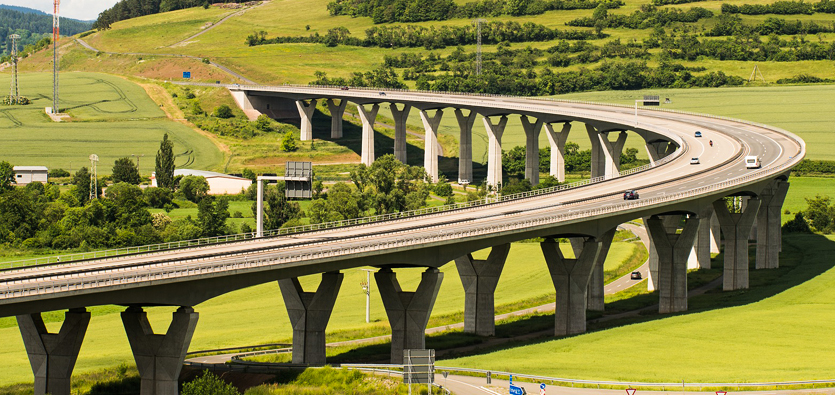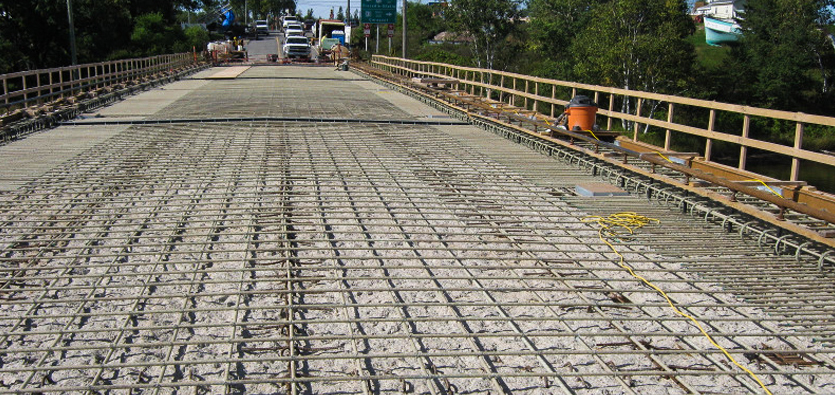
The advanced composite materials have demonstrated great potential in civil applications, especially in the highway infrastructure. Fiber reinforced polymer (FRP) construction materials are lightweight, easy to install, and offer high strength-to-weight ratio with durability. These materials can be customized in accordance with the required properties: size, strength, stiffness, and overall structure.
The deterioration of highway infrastructure is not new, however, a pressing issue. There are a number of factors that damage the integrity of highways and bridges, for instance, the use of substandard concrete reinforcement, heavy loads, short-term maintenance practices, rebar corrosion, and severe environment. The conventional materials such as steel bars cannot withstand the severe environment exposure and high traffic volumes and the concrete deterioration simply becomes unavoidable.
The current highway infrastructure in the United States and across North America is facing a growing deterioration problem, costing governments billions of dollars in rehabilitation cost. Taking into account the need for more sustainable construction materials, the significance of FRP construction materials rises sharply since FRP is the ideal material for the rehabilitation of degraded and underperforming concrete infrastructure. Fiberglass composites enhance the strength and performance of the existing highway infrastructure situated in the harsh environment that could be the top reason why the original structures deteriorated.
Despite the promising properties and in-practice results, the construction industry is still not fully utilizing the power of FRP in rehabilitating the degraded reinforced concrete. However, this exceptional material is all set to dominate the rebar market in future. The availability of adequate in-practice data and design codes have already encouraged a large portion of the civil engineering community to employ composite materials for rehabilitation and new applications. Here are some of the factors that undermine the real potential of FRP construction products for highway infrastructure in the past:
- Inadequate knowledge of FRP composites
- Lack of bridge-specific material specification
- No dependable rehabilitation procedures
- Lack of encouragement from governments
An extensive research intending to develop a precise and strategic plan for providing a comprehensive guide on the application of FRP materials in the highway infrastructure is still in process. Following are some of the advantages of using FRP in building/rehabilitating highways and other concrete infrastructures:
- High strength-to-weight ratio
- Excellent fatigue resistance
- Corrosion-resistance
- Reduced overall cycle-costs
- Ease of installation
- Time-effective repair and construction process

Because FRP composites are lightweight, the reduced deck dead loads enable a bridge to carry increased live loads. Similarly, the environmental durability of FRPs allows bridges to remain corrosion-free and in good shape for a long period of time. One of the most prominent qualities of composite or fiberglass bars is that they do not corrode and successfully resist all the corrosive agents present in an environment, and this is what we need today to build sustainable concrete infrastructure that can offer significant savings in costs for both the governments and taxpayers.
The widespread application of fiberglass rebar and other FRP composite materials can help eliminate the deterioration problems in highways and other concrete structures. As mentioned earlier, FRP composites can be fabricated with the desired structural properties by making a considerate selection of fibers and resins and using appropriate manufacturing techniques. North America is the largest producer and consumer of fiberglass rebar. TUF-BAR, a leading GFRP fiberglass rebar manufacturer in North America, manufactures the highest-quality composite materials for highways and other civil applications. It is time to replace conventional construction materials with the FRP composites so that durable concrete structures can be built.
